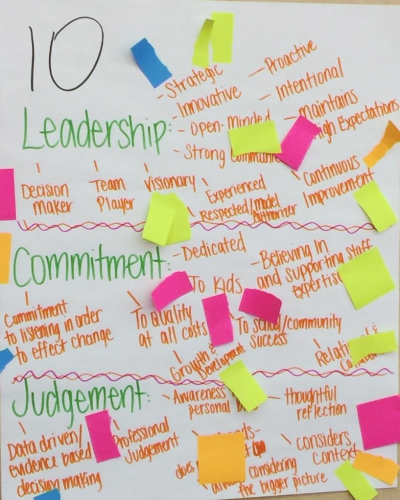 Last month, 44 authorizing professionals came together at a NACSA workshop to find creative ways to apply the findings of our research on what it takes to be a great authorizer: great leadership, institutional commitment, and strong professional judgment.
Last month, 44 authorizing professionals came together at a NACSA workshop to find creative ways to apply the findings of our research on what it takes to be a great authorizer: great leadership, institutional commitment, and strong professional judgment.
These three words—leadership, commitment, judgment—are packed with meaning. We listened in as attendees discussed what these concepts meant for their work and came up with shared definitions for each word. Given this group of authorizers collectively oversees 15 percent of our nation’s schools, there was much to learn. Here are highlights of the conversation.
![]()
Over the course of the two-day workshop, participants kept coming back to one simple question: “is this good for the kids?” The room agreed that creating the best outcomes for kids required leadership that can build relationships, engage, and motivate. Or as one group put it, leadership is about making sure the right people were “on the bus,” and “in the right seats.”
For most groups, leadership also meant having a strong vision, purpose, or guiding principles—and the integrity to stick with it. One group defined leadership by simply writing out their mission: “promoting quality, equity, and access for all.”
Our report’s definition centered on institutional commitment. Many responses resonated with our finding that authorizing must be visible, championed and adequately resourced to do well. Groups wrote that commitment takes “believing in and supporting staff expertise” and “dedication to achieving a goal.”
While institutional commitment is important, participants focused on the personal characteristics that model commitment and enable authorizers to do their work well. One group wrote that authorizing isn’t “just a job,” it is about doing the work with “passion, caring, purpose, success, and pride.” Others noted it was about integrity, loyalty and doing whatever it takes. Or “knowing what the guiding principles are and sticking to them to make tough decisions.” In fact, about a quarter of the groups mentioned persistence and perseverance, capturing the often-political nature of charter school authorizing and the need to remain committed to the mission of what is truly best for kids.
When defining what judgment means for great authorizing, nearly every group mentioned the importance of experience. Groups noted that the ability to make an informed and effective decision not only required data from multiple sources, but experience to consider context and what’s truly best for kids.
Several groups brought up that judgment requires thoughtful reflection and considering the bigger picture—not just the immediate and the now. Or as one group put it, a great authorizer “responds, does not react.”
 Of course, these three elements of successful authorizing are very closely intertwined. At the end of the day, each of the three elements requires authorizers to be “all in” and “do the right thing for the right reasons.” One group even went as far as to draw a venn diagram “Leadership + Commitment + Judgment = Humanity.” It all comes back to why we do this work in the first place: to provide great schools to the families and students we serve.
Of course, these three elements of successful authorizing are very closely intertwined. At the end of the day, each of the three elements requires authorizers to be “all in” and “do the right thing for the right reasons.” One group even went as far as to draw a venn diagram “Leadership + Commitment + Judgment = Humanity.” It all comes back to why we do this work in the first place: to provide great schools to the families and students we serve.


